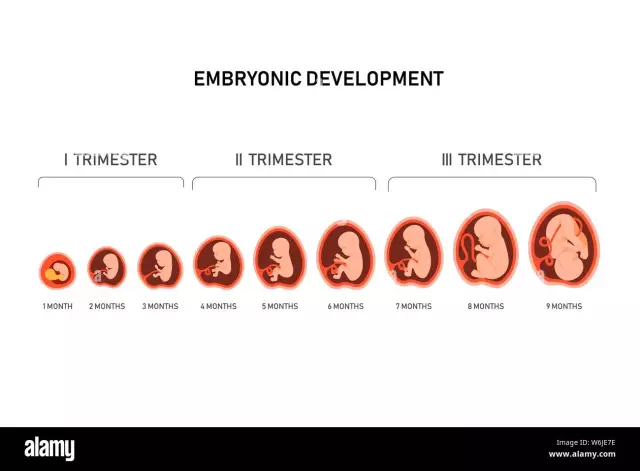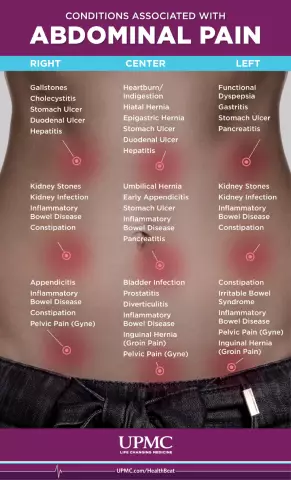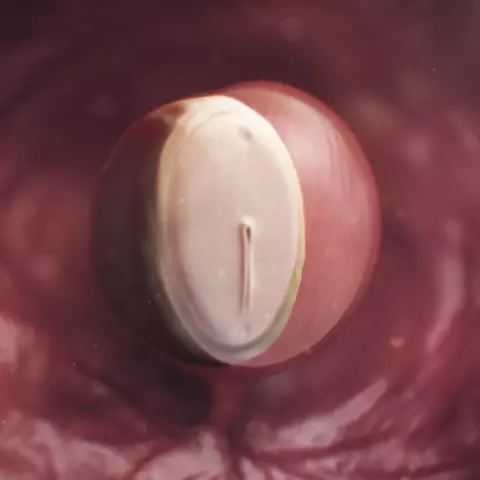- Author Rachel Wainwright wainwright@abchealthonline.com.
- Public 2023-12-15 07:39.
- Last modified 2025-11-02 20:14.
9 weeks pregnant

At 9 weeks gestation, the unborn baby turns 7 weeks from the moment of fertilization. According to obstetric rules, the countdown date is the first day of the last menstruation.
Fetal changes
At the 9th week of pregnancy, the placenta completely took over the task of supporting the fetus, and the unborn child continues to grow and develop. The size of the fetus at 9 weeks of gestation is up to 30 mm in length, weight is up to 2 g. Its appearance is increasingly taking on human features - the body is characteristically elongated, the tail has turned into a tailbone, the head has acquired a rounded shape and has a pronounced inclination forward, you can distinguish the neck. The skin of the fetus is very thin and translucent, through which the vessels are visible.
On ultrasound at 9 weeks of pregnancy, you can see that the arms and legs of the fetus remain disproportionately short, with already formed fingers, nails begin to form on the hands. The changes also affect the face - the eyes are closed for centuries, widely spaced, the mouth gap is formed. The auricles at the 9th week of pregnancy are already clearly distinguishable, but the inner ear is underdeveloped and the fetus cannot hear.
In the brain, at the 9th week of pregnancy, there is an intensive development of the cerebellum - the department responsible for the balance and coordination of the body in space. The pituitary gland is laid down - a part of the brain that is responsible for the regulation of various vital processes of the body and produces some hormones. At the same time, the spinal, cranial and intervertebral nerves are formed. Also in the adrenal glands, a layer of cells is secreted that are responsible for the formation of the hormone adrenaline.
At 9 weeks of pregnancy, the lymph nodes, mammary glands are laid, the testicles in future boys begin to descend from the abdominal cavity into the scrotum.
Changes in a woman's body at the 9th week of pregnancy
The abdomen at the 9th week of pregnancy does not yet change its configuration, and outwardly the woman's pregnancy is invisible. But the processes of adaptation of the female body to bearing a child are intensively going on, which manifests itself in sensations and her mood. During this period, as a rule, the sense of smell is aggravated, because of this, the pregnant woman is very sensitive to odors - very sharp ones can cause nausea and vomiting.
The breasts become painful and sensitive, especially in the nipple area, and the areola of the nipples darkens.
The uterus according to ultrasound at 9 weeks of pregnancy is the size of a grapefruit. Hormonal changes in the body lead to an improvement in the appearance of the skin - it becomes smoother and smoother. For a successful course of pregnancy, the level of female sex hormones and chorionic gonadotropin increases in the blood.
Some people at the 9th week of pregnancy develop constipation, varicose veins in the legs.
The kidneys, heart and lungs of a pregnant woman work in an enhanced mode, as the volume of blood continues to increase, fat stores may begin to be deposited near the internal organs, which play an important role during breastfeeding.
At 9 weeks of gestation, symptoms of early toxicosis in the form of excessive salivation, weakness, nausea and vomiting may persist, but normally these manifestations usually subside.

Due to the growth of the fetus and an increase in the volume of circulating blood at the 9th week of pregnancy, a decrease in hemoglobin in the general blood test, anemia can make itself felt. The lower the baseline hemoglobin level before pregnancy, the faster the symptoms appear.
Yellowish discharge at the 9th week of pregnancy from the vagina should not be scary - it is under the influence of hormones that leucorrhoea thickens - natural discharge. In the absence of other unpleasant manifestations or sensations, they are safe for the fetus and mother. An alarming symptom is spotting at the 9th week of pregnancy.
But pains at the 9th week of pregnancy in the abdomen or in the lower back may be the result of the body's adaptation to the severity of the fetus, or the threat of interruption.
Examination at the 9th week of pregnancy
At a gestational age of 9 weeks, the woman continues to undergo the prescribed examination, if she has not yet had time to do it. A visit to a doctor once every 2 weeks is necessary even if it is normal, and in the presence of risk factors (bleeding, abortion in the past, infections suffered during pregnancy, or exacerbation of chronic pathology), more careful monitoring may be required.
At each visit to the antenatal clinic, a woman brings urine with her for a general analysis. Such screening (general examination) allows one to suspect symptoms of gestosis or other complications of pregnancy at the earliest possible date.
YouTube video related to the article:
Found a mistake in the text? Select it and press Ctrl + Enter.






